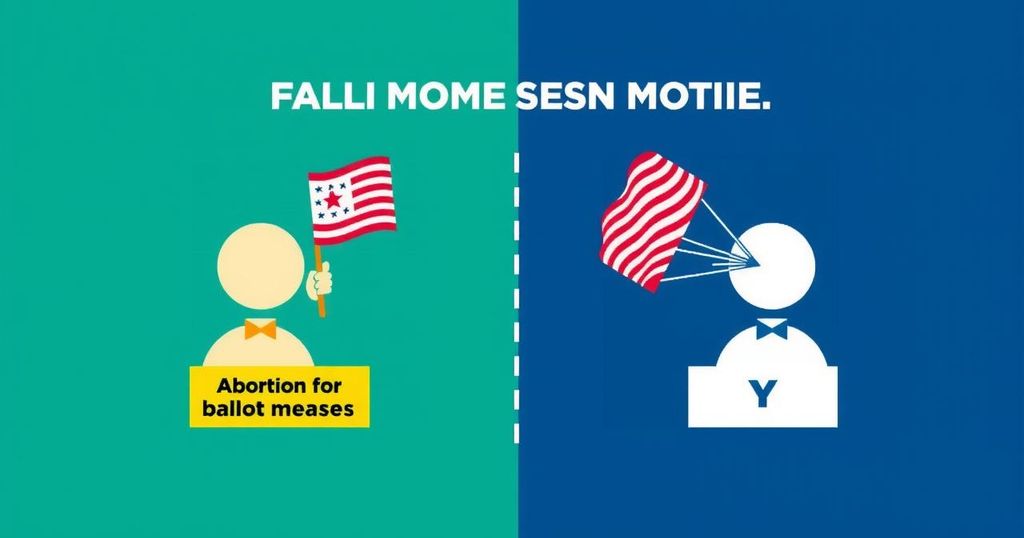Upcoming Election Faces Legal Challenges Amid Competing Ballot Measures

In the lead-up to the November 2024 election, voters are presented with competing ballot measures on abortion rights and election integrity. Former President Donald Trump has reinforced his denial of the 2020 election outcome, emphasizing a desire for a landslide victory to deter accusations of fraud. As both parties gear up for potential electoral disputes, approximately 180 lawsuits surround voting procedures, reflecting a charged legal climate influenced by organized election integrity initiatives and past legal battles.
As the November 2024 election approaches, voters are confronted with significant ballot measures concerning abortion rights and electoral processes, raising questions about the implications should both measures succeed. Former President Donald Trump, the Republican presidential nominee, has reiterated his denial of the 2020 election results and expressed a strong desire for a clear victory in the upcoming election to preclude any accusations of electoral fraud. He stated, “We want a landslide” during a rally in Georgia, emphasizing the necessity of decisive outcomes to eliminate any doubt of election integrity. In light of potential disputes, both major parties are bracing for a protracted struggle over election outcomes and the legitimacy of the results. Numerous legal actions have already been initiated, primarily by Republican affiliates, aiming to contest mail-in regulations, overseas ballots, and other voting procedures. Trump’s past attempts to overturn the 2020 election results have left a legacy of increased litigation following elections, which both parties now recognize as a critical aspect of the electoral process. Legal experts point out that the frequency of election-related lawsuits has tripled since the landmark Supreme Court case in 2000, indicating a shift in the electoral and legal landscape, primarily fueled by escalating political tensions and significant financial backing from wealthy donors. Approximately 180 voting-related lawsuits are currently underway in the lead-up to election day. This has facilitated the emergence of a structured and sophisticated campaign infrastructure focused on litigation, particularly for Republicans, as illustrated by the launch of an unprecedented election integrity initiative by the Republican National Committee. Prominent voices within the party have signaled their readiness for legal confrontations to ensure the integrity of the voting process. Tensions are heightened further by the infiltration of election denialism into various states, often prompting unmerited litigation and fabricating conspiracy theories around elections, despite existing safeguards and a more robust electoral system than in past years. Legal scholars argue that although there have been new frameworks instituted to address electoral disputes, these tools may be exploited by candidates as means to challenge unfavorable outcomes or to instigate delays and disarray in the certification of results. A recent ruling in Georgia invalidated new election rules established by the State Election Board—deeming them unconstitutional—highlighting the judiciary’s role in navigating these electoral disputes. RNC leadership has characterized this ruling as judicial overreach. Hence, while there are established legal procedures for certifying election results, the potential for successfully refusing to certify remains a topic of concern, which could further complicate the electoral landscape during a politically charged year.
The upcoming November 2024 election has become a critical battleground, especially with voters facing contentious ballot measures pertaining to abortion rights and election integrity. The political climate is heavily influenced by former President Donald Trump, who has persistently maintained unsubstantiated claims of electoral fraud from previous elections. His influence has permeated the Republican Party’s approach toward the electoral process. As litigation surrounding voting procedures proliferates, both parties are preparing for an arduous fight concerning the interpretation of election results, driven by increasing polarization and a significantly revitalized election integrity narrative. The current legal climate depicts a surge in litigation, fueled by recent changes in electoral laws and amendments to previous regulations, which might lead to legal disputes in the wake of the election.
In summary, the 2024 election’s landscape is marred by disputes regarding the legitimacy of voting processes and heightened legal confrontations. The overarching narrative points toward an impending electoral conflict that could reshape the understanding of election integrity as various stakeholders contest results amidst heightened scrutiny. As both parties gear up for an electoral battle, the outcome of such legal conflicts, ticketed by competing ballot measures, could have lasting implications on democratic processes in the United States.
Original Source: apnews.com








